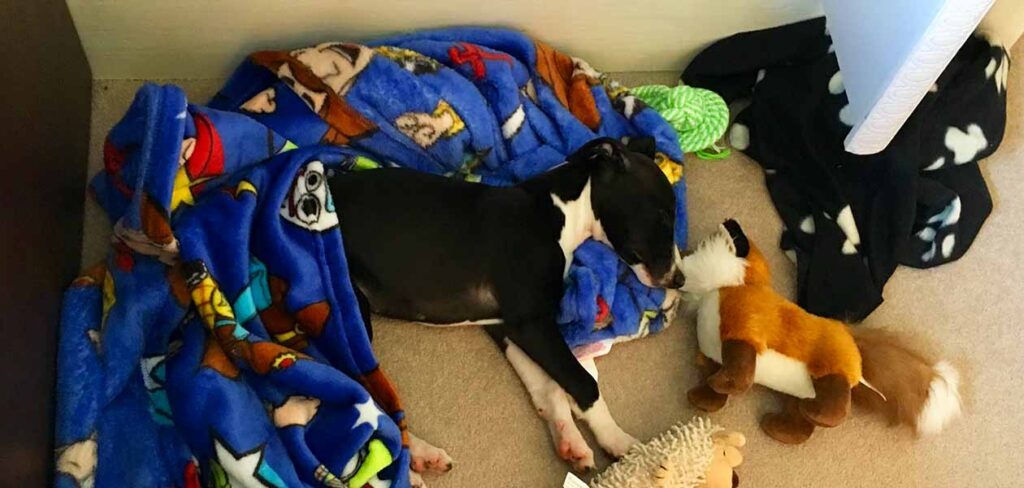
A puppy crying at night is a common problem for many new dog owners.
It usually boils down to one of a handful of common reasons. And once the cause is identified, a solution to match it can be put in place.
It’s often a fraught time, but there’s no need to struggle with it alone.
Puppy Crying At Night
A puppy crying at night is every new dog owner’s worst nightmare.
It stops us sleeping, it stops our neighbors sleeping, and it stops our puppy sleeping.
Which makes everyone (including the puppy) tired and irritable.
Where does crying at night come from?
Is it because they’re scared, lonely, or sad?
Or is it simply attention seeking, because they’re wide awake when they should be asleep?
If you ignore them, will they have a toilet accident?
If you go to them, will it make them more likely to cry for you tomorrow night?
How are you meant to solve any of these mysteries when you’re exhausted and your puppy can’t give you any answers??
Don’t worry
We’re going to help you get back on track.
In this article, we’ll cover
- Why puppies cry at night
- How long crying at night lasts
- Very young puppies who cry at night
- Puppies crying in a crate at night
- And older puppies who have fallen into a habit of crying at night
Solutions for each kind of puppy crying at night are included at each stage, so you can put together a plan of action for your new addition.
But the success of any solution or coping tactic you try to implement will depend upon why your puppy is crying in the first place, so let’s start there.
Why Is My Puppy Crying At Night?
Reasons puppies cry at night include:
- homesickness
- loneliness
- they’re cold or uncomfortable
- they need the toilet
- or they have learned that crying gets your attention.
We’ll go through each of these reasons in turn, with more detail and ideas for overcoming them now.
The Puppy Who Cries At Night When They First Come Home
Crying at night is most common in puppies who have just left their mom and littermates for the first time.
They’re likely to be 7 to 9 weeks old. Until they came home with you, they spent every night of their lives in the only bed they’d ever known, packed in close with mom and their siblings.
Now they’re at your place, and hopefully they’ve still got a blanket which smells like mom, but it isn’t warm like she was. And your puppy can’t hear or feel it breathing through the night.
Everything else around them smells wrong too, and it’s never crossed their mind that they might ever have to sleep alone before…
Suddenly their new situation is very, very scary.
New Puppy Crying At Night
These are some of the reasons why we recommend keeping a new puppy in a crate or high-sided box next to your bed for their first few nights after moving in.
Make sure they’re close enough to hear you breathing, and smell you. So, right next to the bed.
These sensations will comfort them during those first few sleeps, until the rest of your home starts to feel safe and familiar.
Of course the other reason to keep them there is so you can hear them stir if they need a toilet trip!
New Puppy Sleep Regression
Lots of puppies appear to sleep well in a room by themselves for the first couple of nights, so their owners are confused and frustrated if they start crying during their third or fourth night instead.
They’re also reluctant to bring a puppy into their room at that point, because it feels like undoing a good start.
If this is you (and no judgement here if it is – it was also me, three days into owning our first puppy Max! You can see him in the images accompanying this article) then it helps imagine yourself as your puppy for a moment.

From their point of view, everything they experienced in their first couple of days was so new, so unfamiliar, and so overwhelming that they were simply done in by night time.
And you were still a stranger to them. They didn’t know if crying out for you would make things better or worse.
But in fact, they were always a bit frightened at night. And now they’re plucking up the guts to tell you so.
And as you’ve been so kind, they believe that you can make this better for them.
What’s The Solution?
If your new puppy starts crying in the night not long after arriving, don’t be afraid to bring them into your room for a few nights.
Even if they’ve already done a couple of nights in the kitchen.
It’s not an irreversible step backwards!
They’re still very much a baby who needs comfort and reassurance while they get used to a completely new way of life.
They have lots of baby-like behaviors still, which they will grow out of over the coming weeks.
And needing to sleep by your side is just one of those.
Knowing When It’s Time To Move Out
All this begs the question – how long does puppy crying at night last?
How will you know when you can move them into the room they’re supposed to sleep in?
Puppies are usually ready to start sleeping in a room alone overnight when they’re happily heading to their bed for naps alone during the day.
But to avoid undoing all your good work, move their bed little by little over a few nights.
Puppy Crying In Crate At Night
Did you splash out on a nice crate full of lovely bedding and toys for your new puppy?
Perhaps you need them to sleep in it overnight, because you have other pets, or children, or due to the layout of your house.
Your puppy might even be happy to come and go from their crate during the day when the door is left open.
But then everything changes at night time when you close that door.
To overcome this you need to spend time during the day teaching them that the crate is still a happy place with the door shut.
And that the door always gets opened again.
Our crate training guide can help you here, as can the games and techniques in our Dogsnet Puppy Parenting course.
It can’t be done in an afternoon, so in the meantime their open crate needs to be enclosed in a safe room, play pen, or next to your bed at night.
How To Stop A Frightened Puppy Crying At Night
In all of the scenarios above, it’s important to remember that new puppies are very much babies.
Sure they have teeth and they can walk and play, but in terms of emotional maturity, they are still tiny.
You can’t force a baby animal not to be frightened, especially while the frightening thing is still happening.
So it’s ok to offer lots of comfort and reassurance while they build their confidence.
Puppy Soothers
Here are some tried and tested techniques for soothing a frightened puppy at night time:
- Keep them close to you until they feel comfortable being alone in your house.
- When it’s time to move out of your room, give them an item of your clothing to keep in bed with them. Make sure it’s been worn a couple of times without washing first, to get it good and smelly!
- Wrap a hot water bottle in a thick, strong towel so they can snuggle up to something warm.
- Drape a heavy blanket over their crate, to make it cave-like and cosy.
- Some puppy owners have success using white noise machines or heartbeat tracks in the room where their puppy sleeps.
Will I Be Stuck Doing These Things Forever?
Don’t worry about these soothers becoming a rod for your own back.

Over the next few weeks, you puppy will learn that they’re safe in their new home, with you.
Their confidence will grow, and your home will start to feel like their home too.
In turn, night times will become less scary, and they will have no trouble settling themselves to sleep at night.
This will also coincide with increasing bladder capacity and control – meaning they wake up less frequently in the night anyway.
So they will naturally outgrow the sleep aids they needed as babies, or you’ll be able to gradually phase them out.
Just like adult humans don’t need a comforter or pacifier!
An Older Puppy Crying At Night
Most puppies grow out of crying at night fairly quickly.
But for some puppies it turns into a habit which they struggle to shake off, or there’s a reason they’re still upset at night, weeks after coming home.
Eventually though, older puppies need to learn to settle themselves in bed and sleep until morning.
A lot of puppy parents receive advice to let them ‘cry it out’ in order to achieve this.
In fact even the most up to date training methods say you should ignore behavior you don’t want.
So does that apply to night time crying as well? And how is it supposed to work if you’ve got kids or neighbors sleeping nearby?
Should I Leave My Puppy To Cry At Night?
We don’t recommend simply ignoring a crying puppy for as long as it takes.
If your puppy is frightened, leaving them to cry won’t help.
They might eventually stop crying when they realize no one is coming, but they will still be a frightened puppy.
And that’s not going to be a good thing in any other aspect of your life together.
There’s also high risk they’ll end up soiling their bed, and undoing your potty training progress.
So to overcome the problem of older puppies crying at night, it’s to work out why they’re crying, and work out a proactive solution.
Here are the most common reasons for night time crying in older puppies
1. They’re cold
Lots of dogs have their bedrooms in unheated utility rooms, and on the floor, where there are more likely to be drafts.
Puppies lose their body heat more quickly than adult dogs.
Small breeds and short-coated breeds feel the cold more than large breeds and medium- to long- coated dogs too.
Ask yourself how cold their sleeping spot gets at night, and consider adding an extra blanket, or treating them to a cave-type bed.
2. They need to pee
Most puppies can hold their bladder through the night by the time they’re 16 weeks old, but all individuals are different.
Toy breeds, in particular, many need to get up and toilet during the night for more time to come.
If this is still the case for your puppy, the trick is not to reinforce the connection between crying (albeit for a legitimate reason!) and your arrival.
Take back control by setting an alarm and taking them out to pee, before they cry.
As they get older, you can make that alarm later and later, and finally do away with it altogether.
3. Something is disturbing them
Foxes, raccoons, a neighbor leaving home early to work shifts, the boiler firing up and the sun rising early in summer can all disturb a sleeping puppy.
Once they’ve been woken up, if they’ve had a decent chunk of sleep, they’re likely to decide they’re ready to start the day.
White noise tracks and black out blinds may help you here. Or moving your puppy’s bed to a quieter place.
4. You’ve unintentionally rewarded night time crying
A big struggle for puppy parents trying to deal with night time crying is that it can be difficult to manage the situation, without accidentally rewarding the crying.
It usually starts when they’re young enough to still need to pee in the night.
Perhaps you were woken up to taken them out by their cry.
Or you returned to soothe them because they cried when you went back to bed.
These things are so easily done, but your puppy has quickly made the connection that crying makes you appear.
And now they’re using it at other times of night, even though they don’t need to pee.
What To Do When An Older Puppy Is Still Crying In The Night
This broadly depends upon whether they cry when left at bed time, or wake you up crying.
Both of them involve a timer on your watch or phone, a steady nerve, and a bit of patience.
Older Puppy Crying When It’s Time For Bed
Puppies, much like human children, sometimes struggle with that final moment of saying goodnight.
They may embark on a campaign of fussing, crying, complaining, and generally doing whatever they can think of to bring you back.
If crying has worked once, they’ll try it again, and again, and again.
Time passes very, very, slowly when this is happening.
But if you stop rewarding a the behavior, eventually it will die out.
The solution
Once you’re confident that all your puppy’s needs have been met (they’re happy at home, fed, exercised, toileted, warm and comfortable), leave them with one of the puppy soothers listed above, and say good night.
Check the time, and find a spot to sit where they can see you but not reach you. Don’t engage with them.
Your puppy might be disgruntled, even vocally so, but as long as their needs have been met, and they can see you, they won’t be frightened.
Time will start to pass slowly now, so keep an eye on your watch.
Most puppy parents discover that the time it takes for a puppy to fall asleep is much less than it feels!
And the following day it will become less again.
We can’t rule out owing your neighbors a bottle of wine and a box of chocolates for some disturbance, but this approach should see your puppy settling themselves down with no more crying in a few days.
Older Puppies Who Wake Up In The Night And Cry
Crying is a very normal way for baby animals to get attention from their caregiver. In the wild, it is vital for ensuring their survival.
Unfortunately, pet puppies sometimes learn that it is a great way to keep you nearby in the night, or let you know that they’re ready to start the day.
The trick here is to anticipate when they’re going to wake up, and beat them to it. This way, they will unlearn the connection between crying, and you arriving.
So if your puppy is crying from 4am every night, set an alarm for 3:45 and beat them to it.
Resettle them if you can, or start the day, and remind yourself this won’t be forever.
Repeat for a couple of nights, then move your alarm to 4am.
If they wake up before you and start crying, wait outside the door until a break in the crying, then go into them.
Puppy Crying At Night – How Long Does It Last?
Lots of puppy parents have to deal with a phase of night time crying.
Whether it’s due to homesickness, or a learned habit, a puppy who cries in the night can throw us into a tailspin.
But don’t panic.
Look for the reason why they’re crying, use the techniques we’ve described above, and restful sleep will soon be restored to your home.
Our Dogsnet Puppy Parenting course includes more information about settling a new puppy in your home, and how to cope when you feel overwhelmed.
Students also get access to a private members forum where they can chat with other puppy parents going through the same trials, and ask questions of Pippa Mattinson and her team.
Before you know it, the crying phase will soon seem short-lived and long ago in your memory.
How Did You Stop Your Puppy Crying At Night?
Do you have a top tip for soothing a frightened new puppy, or breaking a cycle of crying behavior in an older puppy?
Share it with others using the comments box below!

Maggie says
We have a 4 month German Shepard Husky mix puppy. We take her out to pee before she cries at 5am and put her back in her crate that’s in the hall by our bedrooms. She will not go back to sleep but will cry and cry until we take her out. What can we do to get her to go back to sleep so we don’t have to get up so early 7 days a week
Krystal says
I have a 9 week old German Shepherd puppy and he cries all night. I searches and most websites say to ignore him when he cries through the night but how many times should I take him out to use the bathroom? How do I know if he needs to go potty or just wants attention.?
Lea says
With our pup we followed the happy puppy book advice but instead of having the pup in our room we stayed in the puppy’s room. We slept next to the crate on an air bed the first night, on second night we slept further away from the crate but still in sight and on third night we moved out of sight but in same room. On fourth night we didn’t sleep in the room. This worked with us with two kids as we didn’t want pup upstairs and we also wanted easy access to outside if needed for pup. Hope this helps you